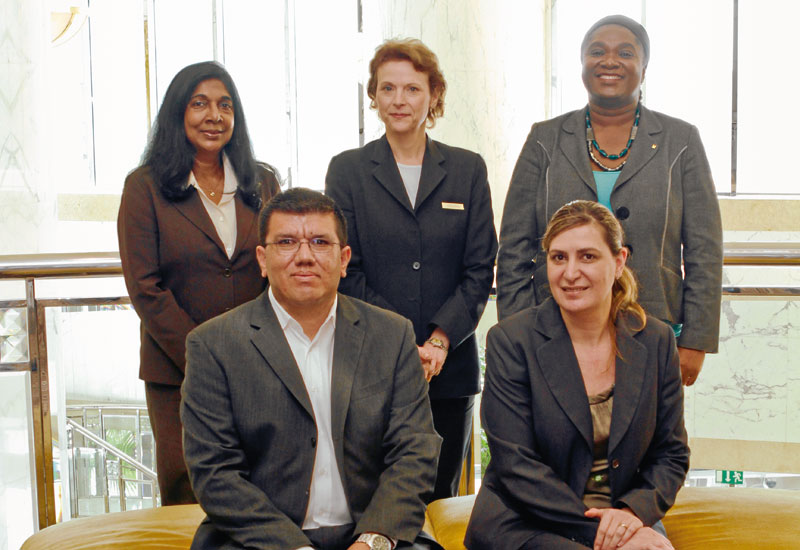Executive housekeepers discuss the impact low wages have on staffing, the need for career progression and the importance of working with other departments
If you think running the housekeeping department of a busy hotel is centred around checking for dust and keeping the toiletries stocked, you can think again. At a recent executive housekeepers’ roundtable, held at the Grand Hyatt Dubai, the housekeeping managers cited recruitment, grass-roots salaries and slippery suppliers as their biggest bugbears.
Managing large, sometimes understaffed departments, building inter-departmental relations, and clocking face-time with guests keeps executive housekeepers more than busy, but they took some time out of their day to discuss some of the key issues in the housekeeping department.

| Advertisement |
What would you say are the key issues facing housekeeping executives?
Dilki Cooray: For me the biggest issue is staffing. There are so many hotels opening at the moment and they are all offering a higher salary, so we end up losing our staff to them. We bring staff out, train them and then once they are trained they move on to another hotel.
Tatjana Ahmed: I agree. Hyatt is a company which gives people in housekeeping opportunities, and housekeeping is a hub — people start here and then they go on to other departments but I think that this is a good thing and it is a nice thing to see them grow and go on to new positions — you just have to make peace with the fact that this can be an entry position.
Annette Damz: In the hotel business we talk about retaining guests, but we also have to retain our staff and housekeeping is the base that everybody comes from.
In housekeeping, the staff tends to move on to other departments because of the salary difference. Housekeeping is one of the most hectic departments, it is really demanding, and the salary difference between us and other departments is huge so they move on — which is very good for them but it disturbs your quality of training and standards.
We have to keep re-training and re-training… I think housekeeping should be looked after even more because we are the most demanding department in the whole hotel sector but we are paid the least.
Susana Pereira: I agree, and being in the region for a few years I haven’t seen a growth when it comes to wages for our housekeeping staff. Ten years ago we were paying AED 500, 600 (US $163) per month, and let’s face it, 10 years down the line they are still on AED 1000 ($272) and that’s a mindset we need to look at in the region, where we still have labour that is below what we consider well paid.
Javier Ferre: Hotels don’t see the importance of housekeeping, and the most important thing for the guest is the cleanliness of the hotel! It is a very difficult job, and maybe we are in line with the salaries around the region but it doesn’t mean we are paying people well … the consistency which we try to put in place is quite difficult when you have this sort of turnover because people are looking elsewhere for a better salary.
How much room is there for the housekeeping staff to progress within the department?
TA: It depends how keen they are, how much they want to develop themselves and what their capabilities are — not everyone is able to become a supervisor, but when we see someone who has potential, we will make sure that they reach it.
DC: We do on-the-job training and we have skill school training at Radisson, so when they join, before we put them into the rooms, we give them all the training and then we put them on their own to work.
If they have potential and can be a key room attendant, we give them more rooms and see if they can do that. They get additional pay of AED 300 ($81) which motivates them as well. I don’t hire anybody from outside [for the higher positions] because then the existing staff don’t want to work as hard; they think they’ll never get anywhere.
AD: When you find someone with great potential, you put a training plan in place for this person and coach them to reach the next position. They do the job better because they have been with you for some time — they know your quality, then know your standards, and they have the motivation and it gets them bubbling to show they can really do it.
SP: I promoted six of my staff to be my supervisors because, yes, you need to look at the potential that they have and you push them forward as much as you can and give them the opportunities to grow. That is pretty much a key thing. I don’t wish to see a room attendant for five or 10 years doing exactly the same thing — that is not in my interest either.
JF: What I am trying to do with people with the skills and the potential to move upwards is to develop them as trainers, so that they can start training other people within the department. We also have another course of leadership where people can develop their skills to become a supervisor.
Right now I have five of my room attendants in that process, and then the next step after that is to become an assistant manager in the future, and I think that this is quite motivational. If you have these skilled people with good potential in your department, then this is a way to keep them there — to motivate them with development.









 Search our database of more than 2,700 industry companies
Search our database of more than 2,700 industry companies









